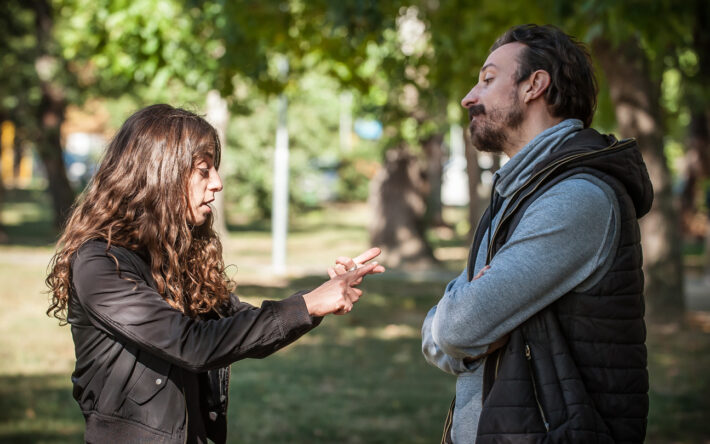There’s nothing worse than feeling like the person you love is slipping away.

Maybe they’ve become distant, less affectionate, or just don’t seem as invested in the relationship as they once were. Whatever the case, it’s easy to panic and assume the worst. But before jumping to conclusions, it’s important to step back and figure out what’s really going on. Here’s what to do when it feels like your partner doesn’t love you anymore. Chances are, you’re wrong — and even if you’re right, panicking straight away isn’t the way forward.
1. Don’t assume the worst right away.

Just because they seem distant doesn’t automatically mean they’ve stopped loving you. People go through phases, stress can take a toll, and sometimes, emotional shifts have nothing to do with the relationship itself. Instead of immediately thinking the worst, take a step back. Have they been dealing with something at work? Are they struggling with their own mental health? There could be plenty of reasons for their behaviour that have nothing to do with falling out of love.
2. Look at their actions, not just their words.

It’s easy to focus on what they’re saying (or not saying) but actions tell you much more. Are they still showing up for you in little ways? Do they make an effort, even if they don’t say “I love you” as often? Love doesn’t always look like constant affection or grand gestures. Sometimes it’s in the way they remember your coffee order, check in on you during the day, or make sure you’re comfortable. If their actions still show care, their feelings might not have changed as much as you think.
3. Communicate without making accusations.

If something feels off, talk about it, for sure — but the way you bring it up matters. Instead of saying, “You don’t love me anymore,” try, “I feel like we’ve been a little distant lately. Is everything okay?” Approaching the conversation with curiosity rather than blame makes it easier for them to open up. If they feel attacked, they might shut down, which won’t get you any closer to the truth.
4. Think about whether the relationship has changed on both sides.

It’s easy to notice when your partner pulls away, but have you changed too? Relationships naturally evolve, and sometimes, both people contribute to the distance without realising it. Think about how you’ve been interacting lately. Have you been as affectionate, understanding, and engaged as you used to be? A change in dynamics isn’t always one-sided, and recognising your role in it can help you reconnect.
5. Don’t chase them — give them space.

When it feels like someone is pulling away, the instinct is to hold on tighter. But smothering them with attention, constant “Are we okay?” conversations, or trying to force closeness can push them away even more. Sometimes, people just need space to work through their emotions. If you keep trying to fix everything immediately, you might not be giving them the breathing room they need to come back on their own.
6. Consider what might be affecting their emotions.

Not everything is about the relationship. Stress, anxiety, grief, or personal struggles can make someone withdraw, even if they still love you just as much. Instead of taking it personally, try to understand what they’re going through. Are they overwhelmed at work? Dealing with family issues? Feeling stuck in other areas of life? Supporting them through it rather than assuming they don’t care might be all it takes to bring you back together.
7. Check if your needs are being met.

Sometimes, it’s not about whether they still love you—it’s about whether you feel loved in the way you need. If their way of expressing love has changed, or if they’re showing it in a way that doesn’t resonate with you, it can create a disconnect. Think about what makes you feel cared for and whether that’s missing. If you need more affection, reassurance, or quality time, let them know rather than assuming they should just know.
8. Bring back the things that made you close in the first place.

When relationships start feeling distant, it’s often because routines take over, and the little things that built intimacy fade away. Think about what used to make your connection strong — deep conversations, shared activities, inside jokes. Instead of focusing on what’s missing, actively bring those moments back. Plan a date night, bring up an old memory, or make an effort to do something you both used to enjoy. Sometimes, reconnecting is as simple as remembering why you fell in love in the first place.
9. Pay attention to how they respond to effort.

If you make an effort to reconnect, and they seem open to it, that’s a good sign that the love is still there. However, if they consistently dismiss, ignore, or shut down any attempts to rebuild intimacy, that’s something to take seriously. Rebuilding closeness is a two-way street. If they aren’t meeting you halfway, it might be time to consider whether they’re still invested in the relationship.
10. Avoid turning the relationship into a test.

It’s tempting to start testing them — waiting to see if they text first, holding back affection to see if they notice, or playing mind games to gauge their reaction. However, all this does is create more distance. If you want to know where you stand, direct communication is always better than passive-aggressive tests. If they feel like they’re constantly being evaluated, they might pull away even more.
11. Don’t beg for love or validation.

Feeling unloved can make you desperate for reassurance, but constantly asking, “Do you still love me?” or “Are we okay?” can put pressure on the relationship. Love should be given freely, not begged for. If they do still love you, trust that they’ll show it in their own way. And if they don’t, no amount of pleading will change that. It’s better to focus on how you’re being treated rather than trying to force a response.
12. Be honest about whether you’re happy.

If you’re constantly feeling unloved, it’s important to ask yourself if you’re actually happy in the relationship. Love isn’t just about them still wanting to be with you; it’s about whether you feel fulfilled and appreciated. Sometimes, we hold onto relationships out of fear rather than real happiness. If you’re constantly feeling unwanted and unimportant, it might be worth considering whether this is the right relationship for you.
13. Accept that love changes over time.

Love doesn’t always stay in the same form it started in. The intense passion of the early days often fades, but that doesn’t mean love is gone — it just evolves into something deeper and more stable. If you’re expecting constant butterflies and romantic gestures, you might be missing the quieter ways love is expressed, like consistency, support, and commitment. Understanding this can help you stop mistaking emotional shifts for lost love.
14. Be prepared to walk away if things don’t change.

If you’ve tried everything — communicated, made an effort, given space — and nothing improves, you have to consider whether staying is worth it. Love should make you feel safe, valued, and connected, not constantly insecure and unwanted. Sometimes, the hardest but healthiest choice is accepting that the relationship has run its course. If they truly don’t love you anymore, no amount of effort will change that. Letting go might be painful, but staying in a relationship where you don’t feel loved will hurt even more in the long run.




